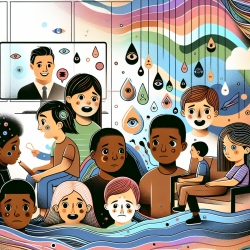Introduction
In the digital age, mobile health (mHealth) applications have emerged as powerful tools for promoting healthier lifestyles among adolescents. Recent research, particularly the study "Usability Testing an mHealth Program with Tailored Motivational Messages for Early Adolescents," has shed light on the potential of these apps to address pressing health issues such as pediatric obesity. This blog explores the findings of this study and discusses how practitioners can leverage these insights to enhance their interventions.
Understanding the Research
The study conducted usability testing on a novel mobile app designed to engage early adolescents in healthy eating and active living. The app was developed with a focus on low-income middle school students, a demographic at higher risk for obesity. By incorporating tailored motivational messages, the app aimed to encourage behavioral changes in its users.
Guided by behavioral change theories (BCTs) such as the Self-Determination Theory (SDT), Social Cognitive Theory (SCT), and Priming Theory, the app's design focused on enhancing user engagement and effectiveness. The usability testing revealed that the app was well-received across different genders and weight statuses, with positive feedback on its motivational messages.
Key Findings and Implications
- Usability: The app scored high on ease of use, usefulness, learnability, and user satisfaction. These factors are crucial for ensuring that adolescents can effectively engage with the app and its content.
- Motivational Messages: Tailored messages were found to be effective in promoting healthier choices. The study participants reported learning new information about nutrition and feeling motivated to make better food choices.
- Behavioral Change Theories: The integration of BCTs in the app's design was pivotal. By aligning with theories like SDT and SCT, the app fostered a sense of competence, autonomy, and relatedness among users, crucial for sustained behavior change.
Practical Applications for Practitioners
For practitioners working with adolescents, especially in school settings, this research offers valuable insights. Here are some practical applications:
- Incorporate Tailored Messages: Design interventions that include personalized motivational messages. These can be tailored based on individual preferences and behaviors, as demonstrated by the app's success.
- Leverage Behavioral Theories: Utilize BCTs to guide the development of health programs. This approach ensures that interventions are grounded in proven psychological principles, enhancing their effectiveness.
- Focus on Usability: Ensure that any digital health tool is user-friendly and engaging. High usability increases the likelihood of sustained use and positive health outcomes.
Encouraging Further Research
While the study provides promising results, there is a need for continued research to refine and expand the use of mHealth apps in pediatric health interventions. Future studies could explore the long-term impact of such apps on health behaviors and outcomes.
To read the original research paper, please follow this link: Usability Testing an mHealth Program with Tailored Motivational Messages for Early Adolescents.










